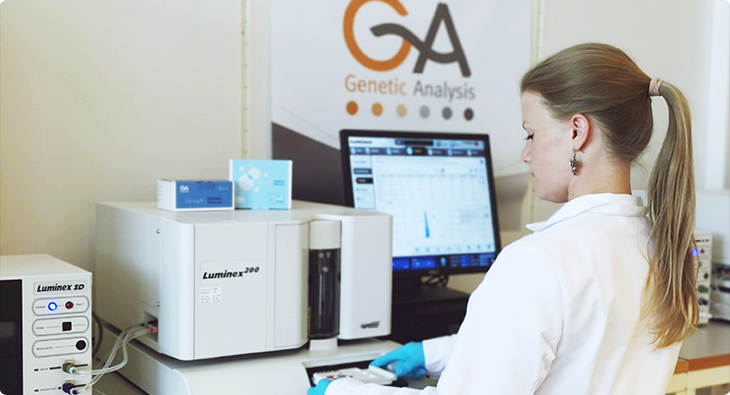xMAP® Technology powers a commercial assay spanning 50 biomarkers
Our research Partners are an invaluable part of our team, connecting the xMAP® community with powerful, customizable kits and application and product expertise. On our blog, we’d like to shine the spotlight on our unique Partners and the work they’re doing with xMAP® Technology.
Based in Norway, Genetic Analysis offers testing to help physicians understand the health of their patients’ gut microbiomes. We profiled their team in 2017, and since then, they’ve made exciting progress in a few key areas.

Scientists at Genetic Analysis developed the GA-map® Dysbiosis Test, an assay that analyzes fecal samples to determine whether or not a patient’s gut microbiome is in a healthy state. When dysbiosis occurs, patients may experience conditions such as inflammatory bowel disease, irritable bowel syndrome, and other problems.
The test, based on xMAP Technology, analyzes 50 microbial targets associated with symbiotic gut microbes. That information is calculated into a dysbiosis index value and compared to a healthy reference profile to assess each patient. The test can be run at the Genetic Analysis service lab or ordered as a reagent kit for use in other labs. It was the first CE-marked in vitro diagnostic (IVD) test to provide microbiota profiles and dysbiosis status for gastrointestinal indications.
Building this assay has taken substantial research and dedication, especially since there is no simple definition for what makes a healthy gut microbiome. “We have collected hundreds of normal healthy samples, and they are all different,” said Finn Terje Hegge, PhD, Chief Technical Officer.
The team started building its reference profile based on samples from healthy donors in small countries with less diverse populations: Denmark, Sweden, and Norway. “We found a set of markers that were always present in the healthy population,” Dr. Hegge said. After that, the team expanded to Germany, Spain, and Italy. “We found that those markers were also valid for those countries,” he added. Now, the company is analyzing samples collected in the much more heterogeneous United States and aims to move to China next.

As this core set of biomarkers is validated in more populations, the Genetic Analysis team is also collaborating with universities and hospitals to document how useful the test is for guiding disease treatment, monitoring disease progression, and analyzing fecal microbiota transplants.
When the dysbiosis test was initially conceived in an academic lab, it was originally based on microarray technology, but Dr. Hegge and his colleagues knew that approach wouldn’t scale for the high-throughput lab they built as the test was being commercialized. Likewise, qPCR assays couldn’t multiplex to cover 50 different biomarkers. They identified xMAP Technology as a strong candidate because it could analyze many different biomarkers in a single tube. The team also liked Luminex’s reputation. “We wanted a Partner that was bigger and stronger than ourselves,” Dr. Hegge said.
Achieving growth and increased value with a Luminex Partnership
As a Luminex research Partner, we support Genetic Analysis with their marketing and technical efforts. “Luminex understands the challenges of small companies and that things don’t always happen as planned,” Dr. Hegge said. “They are very helpful and responsive. I would definitely recommend Luminex as a Partner.”
Our Partners are a diverse group of industry leaders representing different market segments and expertise areas. To learn more about Genetic Analysis, visit their website. For more information about the benefits of becoming a Luminex Partner, you can check out our Partner page.
For Research Use Only. Not for use in diagnostic procedures.
Related Content
- Browse 1,200+ Partner Kits with xMAP® Kit Finder [Online Tool]
- Multiplex Technology Optimizes Traditional Immunogenicity Testing [Blog]
- Meet xMAP® INTELLIFLEX! A First Look at the Newest xMAP® Technology Platform [Blog]
- The Versatility of Multiplex Antibody Titer Assays for COVID-19 and Beyond [Blog]
